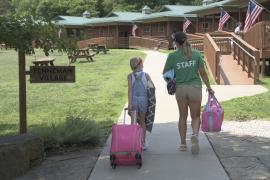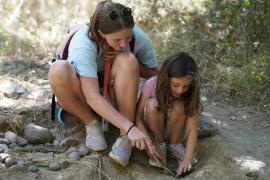Staff retention is a significant challenge for many seasonal camps. Although camp managers do their best to achieve high or even equal retention rates of their seasonal staff, it is still very likely that they face both attrition and turnover, annually. Reasons that counselors may choose not to come back to camp, include:
- Major life transitions, such as beginning a career after graduating from college, getting married, or entering professional school
- fatigue sets in
- working long hours
- summertime temperatures
- working with young children every day
- lack of free time or mental-health breaks
- snacks, sodas, and food not part of the regular camp food service offerings
- and lastly, missing their daily lives such as hanging out with friends or family, relaxing, and participating in their own leisure activities
Retention of staff across subsequent seasons has many benefits. Retention reduces the expense of finding and recruiting new employees, produces employees who are fully oriented to camp operations and policies and are valued by their employers. Returning camp staff have strong reason to expect to enjoy their work duties and the experiences associated with their work.
To address staff attrition and retention, a four-day reflection program was developed. The reflection program was designed to help staff recognize and celebrate moments during their day that their psychological needs for autonomy, competence, and relatedness were met. Reflection sessions were conducted in small groups (five participants per group) at the end of each day. Our goal was to help counselors recognize their daily successes and help them feel as appreciated as possible. We also saw this as an opportunity for staff to reflect and realize these accomplishments.
We monitored staff’s intentions to return for the following summer and compared those scores with scores from preceding weeks, during which no reflection program was provided. Based on our results, we have developed suggestions to run a similar program for seasonal camp staff employees:
For the program, provide snacks, candy and soda not typically offered during camp. Try to stay in a desired time frame of 30 minutes per group, but some participants will have lots to say (which we learned was very mentally beneficial to them).
Start the program by introducing yourself and your purpose for the reflection program and then spend around five to 10 minutes discussing the participants’ highs and lows for each day. The participants really enjoyed this because not only were they sharing these moments and feelings with us, but with each other, and together they were able to celebrate each other’s highs and talk through each other’s lows.
After this, proceed with specific questions that you wish to know to fix your staff retention problem. Our strategy for these questions was founded in the self-determination theory (Deci & Ryan, 2008). Self-determination theory maintains that humans have three organismic psychological needs: autonomy, competence, and relatedness (Ryan & Deci, 2017). When people lead lives deficient in instances of meeting these needs, severe social and psychological dysfunctions result. Conversely, occasions in which people successfully execute actions that affirm these needs, they feel a highly rewarding sense of gratification and pleasure (Ellis et. al, 2019).
The questions for the guided discussion we implemented were much like the following:
Autonomy
“Please try to think about a time today when you used your own creativity or initiative to solve a problem, complete a task, or make something better. This would be a time that you did something ‘your way’ and it worked for you and others.”
Competence
“Please try to think about a time today when you did something that you are good at. Maybe you are good at solving problems, helping campers resolve conflicts, teaching activity skills, or making other people happy. Anything at all. Think about when you did something you are good at.”
Relatedness
“Please think about a time today that you felt a close friendship or attachment to someone else or to other people. That person or those people can be anyone, including members of our camp staff, campers, or anyone else.”
Some of the answers we received, included:
- “I was leading this activity with my coworker and we faced this challenge, but we were able to overcome it.”
- “I’m afraid of heights and never participated in the rock wall, but this kid was scared and asked me to climb with her and so I overcame my fear to make her feel better.”
- “Recently our staff have been feeling very fatigued and burnt out so I’ve made it my job to try to cheer everyone up and make them laugh.”
There are many ways to modify this reflection program to fit your camp and staff needs’ best. We have come up with ideas that may further benefit the participants who are involved in the program:
- Offer outside consultants/counselors to make sure counselors are doing okay. If it fits in the camp budget, this may be beneficial to hire someone that the staff feels comfortable sharing with. If there are issues concerning the camp, other staff members, or the employers, counselors may feel uncomfortable discussing these with someone who has the ability to discipline or fire them.
- Provide the staff with opportunities to go outside the camp (eat at a restaurant, go driving, watch a movie in theaters, or anything else that could refresh them mentally away from the campgrounds).
- Providing them snacks they wouldn’t normally get at camp. We offered sodas, junk food, and candy, and they tore it up. It increased their moods and allowed them to trust us and participate in the discussion.
- Weekly survey or one-on-one reflection to see where they are at, mentally, and gain a basis for how to help them push through the summer
- Let them talk as long they want. The reflection gives them an opportunity to open up and get things off their chest. Condensing the time they talk into one to two minutes doesn’t have the same results as a five-minute spiel where they can thoroughly reflect.
After participating in this program, we learned that it is difficult for young adults to find affirmation in themselves and their abilities. People tend to focus more on negative relationships and moments or things that didn’t go right that day, but once they are asked to share positive experiences or instances, they are reminded that it was a good day after all and they are indeed, making a positive difference. Remember that reflections are a unique way to make your employees feel motivated and valued at work. Although you can modify it to fit your camp, it is important to know that reflections help improve your staff and ultimately, your camp.
References
Deci, E. & Ryan, R. (2008). Self-determination theory: A macrotheory of human motivation, development, and health. Canadian Psychology/Psychologie Canadienne, 49(3), 182-185. psycnet.apa.org/doi/10.1037/a0012801
Ellis, G., Jiang, J., Locke, D., Woosley, J., Co, L., and Snider, C. (2019) Abstract of the case study: Building retention intentions of summer camp staff through psychological needs-based refection experiences.
Ryan, R. & Deci, E. (2017). Self-determination theory: Basic psychological needs in motivation, development, and wellness. New York: The Guilford Press.
This blog was written as part of Project Real Job’s initiative to support camps with staff recruiting, hiring and retention efforts.
The views and opinions expressed by contributors are their own and do not necessarily reflect the views of the American Camp Association or ACA employees.




